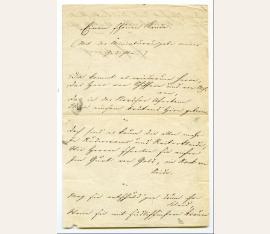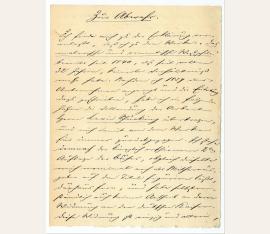Dichter (1810-1876). Autogr. poem (12 lines) signed ("F. Freiligrath"). O. O. u. D. 1¼ SS. Gr.-8vo.
$ 6,964 / 6.500 €
(32634/BN24696)
"Da kommt es wiederum heran | Das Heer von Schiffern und von Mohren | Das in der Nordsee Uferbann | Mein einsam brütend Hirn geboren. | Doch sind es kaum die alten mehr | In Ruderwams- und Reiterkleide; | Wie Herren schreiten sie einher | Im Gurt von Gold, im Rock von Seide [...]". - Slightly browned and with small tear in lower margin.
Dichter (1810-1876). "Zur Abwehr". Eigenh. Manuskript mit U. Stuttgart. 1½ SS. Kl.-4to.
$ 6,964 / 6.500 €
(92353/BN61602)
Vollständiger Artikel für eine Zeitung in eigener Sache: "Ich finde mich zu der Erklärung veranlaßt, daß ich zu dem Werke: 'Das malerische und romantische Westphalen' bereits seit 1840, also seit vollen 32 Jahren, keinerlei Verhältniß mehr habe. Nachdem ich 1839 das Unternehmen angeregt und die Einleitung dazu geschrieben, habe ich in folgenden Jahren die Vollendung der Arbeit Herrn Levin Schücking übertragen, und mich damit von dem Werke für immer zurückgezogen. Ich stehe demnach der kürzlich erschienenen 2ten Auflage des Buches, obgleich dieselbe mich nominal noch als Mitherausgeber auf dem Titel figuriren läßt, durchaus fern, und habe selbstverständlich auch keinen Antheil an deren Widmung an den deutschen Kaiser [...]".
- Freiligrath hatte mit seinem Freund Levin Schücking, der auch Beiträge verwertete, die ihm von Annette von Droste-Hülshoff zur Verfügung gestellt wurden, 1840 "Das malerische und romantische Westphalen" veröffentlicht. "Dieses Werk ist im Zusammenhang mit einer starken Zeitströmung zu sehen. Landschaft und Region wurden als politischer Bezirk und literarisches Neuland entdeckt, das Interesse an Märchen, Sagen und literarischem Volksgut erwachte" (Wikipedia). - Von kleinen Randläsuren und Faltspuren abgesehen gut erhalten..


